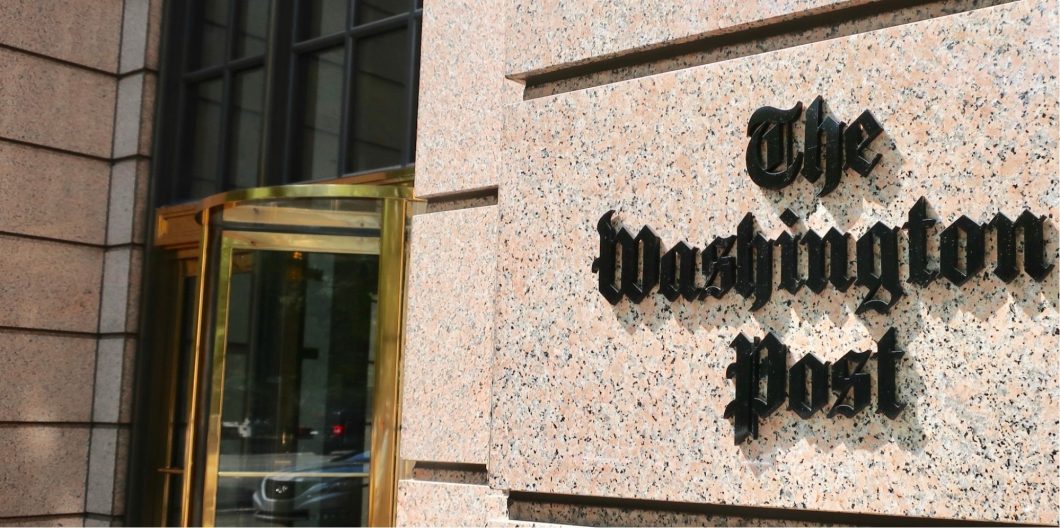NPR's new ethical guidelines for its journalists could benefit from centuries of natural law tradition.
All About the Narrative
Towards the end of All About the Story: News, Power, Politics, and the Washington Post, the new memoir by former Washington Post executive editor Len Downie, there is an irony so huge that only a journalist could miss it. Mere pages after Downie cites that awful, nonsensical cliche that “journalism’s job is to comfort the afflicted and afflict the comfortable,” he relates being forced to retire. It’s January 2008, and Downie is summoned to publisher Bo Jones’s office and informed it is time for him to go. Downie doesn’t take the news well. “I became numb as he discussed the details…I was determined not to show how shocked I was. I did not argue or ask questions.” After retreating from Jones’s office, Downie called his wife: “Something big, something life-changing has just happened,” he said.
It’s a great switchback: the man who wants to afflict the comfortable (why the comfortable should be attacked has never really been explained) was in fact one of the most comfortable—the rich top dog at one of the nation’s wealthiest and most elite media empires. He suddenly finds himself out of a job—afflicted, you might say, with unemployment (although his retirement perks ensured he would have a soft landing).
The reason for Downie’s sacking was the changing nature of journalism. By 2008 the digital revolution had drained advertising dollars, and the Post wanted younger, sharper staffers to handle the change. Soon the paper, which had been owned by the Graham family since 1933, would be sold. The Post was subsequently bought by Amazon’s Jeff Bezos in 2013. Since then, the paper, which has always been reliably liberal, has gone hard left, becoming sloppy, hysterical, and rawly radical. Donald Trump drove them insane.
Although Downie’s tenure was fairly recent, All About the Story reads like an artifact from a different and distant epoch, when journalists were liberal but not corrupt, duplicitous social-justice zealots. Downie led the Post from 1991 to 2008, taking over after the retirement of legend Ben Bradlee. Under Downie’s leadership, the Post won 25 Pulitzer Prizes, including three Pulitzer Gold Medals for Public Service. One of the most impressive stories highlighted the horrible conditions soldiers faced at Walter Reed Medical Center. The exposé led to real reforms.
Downie, a phlegmatic man, was born in Cleveland to parents who valued humility. He went to Ohio State University, a fact that made his Ivy-League Post colleagues nickname him “Land Grant Downie.” He was “addicted” to journalism from an early age, and worked on his college newspaper. His parents taught him to be inquisitive and to see both sides of an issue, a fact that Downie says accounts for his view that abortion is “a real dilemma.” Beginning as an intern at the Washington Post in 1964, he soon worked his way up to city reporter, then to various upper-level editor spots, and finally to the top position.
All About the Story offers insight into the hard work of covering local stories as well as some of the most important historical events of the last 50 years: the assassination of Martin Luther King Jr., Bill Clinton’s impeachment, the September 11 attacks, and the invasion of Iraq. The weakest chapter is on the 1968 riots that destroyed large parts of Washington. Downie is perfunctory and superficial here, ignoring the radical nature of those who caused the destruction.
For some reason, Donald Trump, an abrasive, somewhat comical businessman from New York, has driven the press crazy, rendering them incapable of seeing two sides of an issue, as Len Downie did.
Of course, Downie spends a lot of time on Watergate, which turned the Post staff into movie stars and the Post from a small local paper to a rich international one. The reporting of Bob Woodward and Carl Bernstein drove Richard Nixon from office, an event that made journalism seem like a sexy and dangerous profession and that filled newsrooms with generations of elite liberals and hard-core leftists.
However, the person who comes off the worst in All About the Story is not Nixon, but Hillary Clinton. Downie’s dislike for Clinton is palpable. When in 1994 the paper began “pursuing significant questions about the relationship the Clintons had with the failed Madison Guarantee Savings and Loan Association in Little Rock, Arkansas, when Bill was governor,” Downie and the first lady had a tense meeting at the White House. Clinton was irritated that the Post was reporting on the federal investigation into the Clintons and their deals in Little Rock, yet she refused to turn over any documents related to the case. Downie would not back down. Clinton then switched the subject to the various women who were claiming to have had affairs with her husband—a kind of preemptive strike against their credibility. (She would also dispatch George Stephanopoulos to have lunch with Downie and try to kill the stories.) After the meeting, Clinton began to spread rumors that Downie was out to get them and that he was jealous of Ben Bradlee. Despite being criticized by other journalists and liberal activists, Downie defends his coverage: “I strongly believe that we did what we should have done in holding the Clintons accountable for their behavior. Even as I write this, I believe that there remain significant unresolved questions about the veracity of both Clintons.”
Such a view is not possible at the Washington Post in 2020. Under President Trump, the media has had a nervous breakdown. For some reason Trump, an abrasive, somewhat comical businessman from New York, has driven the press crazy, rendering them incapable of seeing two sides of an issue, as Len Downie did. It can’t all be due to political differences, as Trump supports gay marriage, is critical of needless wars, and has passed prison reform. Perhaps Trump is reviled because, like “Land Grant Downie,” he is not from the elite world of the journalists. That is to say, Trump grew up wealthy, but being from Queens and working in real estate and the hospitality industry always understood the private sector and empathized with and appealed to workers—the same workers that came out to support him by the millions.
Whatever the cause, the media has followed the marching orders. In July 2016 the Post ran a piece by New York University professor Jay Rosen, who argued that Donald Trump made it necessary for journalists to change tactics.
Trump isn’t behaving like a normal candidate; he’s acting like an unbound one. In response, journalists have to become less predictable themselves. They have to come up with novel responses. They have to do things they have never done. They may even have to shock us…they may have to call Trump out with a forcefulness never seen before…they will have to explain to the public that Trump is a special case, and the normal rules do not apply.
Jettisoning the normal rules means throwing temper tantrums, ignoring sources that would contradict the facts, and going all-in on the fiction that Russians had worked with the Trump campaign to affect the outcome of the 2016 election. (Full disclosure: I have some personal experience with the bad reporting at the Post). As Andrew McCarthy has reported, Director of National Intelligence (DNI) John Ratcliffe has declassified and released information that reveals that, in McCarthy’s phrase, “Mrs. Clinton approved her campaign advisers’ proposal to blame Moscow’s hacking of Democratic National Committee (DNC) emails on a conspiracy between Donald Trump and Vladimir Putin.” As would come as no surprise to Leonard Downie, the Clintons were trying to divert the heat from their own shady dealings to others. And it worked. Part of the Mueller probe into Russia involved a story that ran in the Washington Post in July 2016. The headline: “Trump Campaign Guts GOP’s Anti-Russian Stance in Ukraine.” As Byron York points out (and elaborates on in his book Obsession), the story was completely false—“not only wrong, but 180 degrees wrong.” The Post then reported that Russian hackers had penetrated the U.S. power system through an electrical grid in Vermont, a preposterous story that was completely bogus.
At the end of All About the Story, Downie recalls what Jeff Bezos told the entire staff when he bought the paper in 2013, that they should think about what was going to be “the next golden age of the Washington Post.” It would never come. Downie went on to become a professor. He also wrote a searing report, “The Obama Administration and the Press,” condemning the Obama administration for its faux transparency. “The problem is what they are making transparent are helpful to the image of the administration,” Downie said. “In some cases, it’s providing information about things journalists are barred from, so that you only get the government’s view.” With the Biden administration, as with the Obama administration, the government’s view and the views of the fourth estate will likely be one and the same. “Land Grant Downie” got out just in time.


